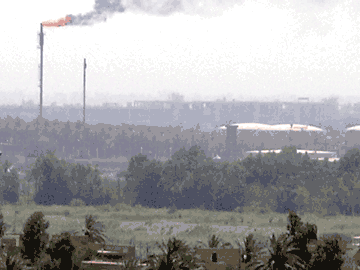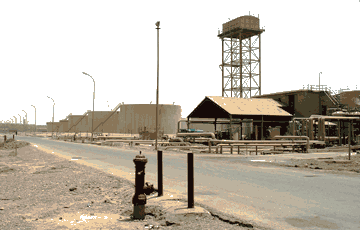 Since the beginning of this year, international
oil prices have steadily increased to their highest level in recent
years. By April they had reached $25 per barrel, 25% higher then the
same period in 2001 1.
Petroleum no doubt has played a covert but significant role in the Since the beginning of this year, international
oil prices have steadily increased to their highest level in recent
years. By April they had reached $25 per barrel, 25% higher then the
same period in 2001 1.
Petroleum no doubt has played a covert but significant role in the
recent international conflicts. During Israel's military invasion
of the West Bank last April, when U.S. Secretary of State Colin Powell
was failing to make any progress in his mission to Israel and Palestine,
there was a series of little noticed but deeply important international
oil struggles: on April 8th Iraq announced a 30-day oil embargo against
the U.S. to protest Israeli attacks on Palestine, and on April 12-14
Venezuela underwent a military coup that disrupted its oil supply
2.
When it comes to oil, there's no question that all eyes remain focused
on Middle East production, despite the importance of other major international
producers such as Mexico, Russia and Venezuela. Iraq and the other
major Gulf region oil producers (Iran, Kuwait and Saudi Arabia) still
carry such a weight that Iraq's recent decision to cut off oil exports
for one month deeply affected the international oil market.
The United States, on the other hand, uses its military
and political muscle to undermine international oil prices in its
own favor, to send an unquestionable message to the world that America
is the only country allowed to decide who can produce, who can sell
and who can buy at what price. April's failed military coup against
Venezuelan President Hugo Chavez is a clear example of how U.S.
oil interests will undermine
democracy in a country which dares to sell oil to Cuba or to stand
with the Iraqi oil embargo against Israeli attacks on Palestine.
And the US military has remained in the Middle East protecting corrupt
Gulf oil monarchies since the 1990-91 Gulf War, as well as, since
September 11, furthering its own objectives in Afghanistan.
It's the Oil, Stupid
The oil market is completely and artificially controlled by the
Organization of Petroleum Export Countries (OPEC) and by Western
powers/buyers such as the United States. For the past 10 years,
although countries such as Canada (biggest oil exporter to U.S.
last year), Venezuela (ranking 3rd) and Mexico (ranking 4th) export
more oil to the U.S. then Gulf countries, nevertheless it is Saudi
Arabia (ranking 2nd),
Iraq (ranking 5th), Kuwait, and Iran (U.S. embargo against Iran
since the 1979 revolution, no oil exported to U.S.) who control
the price. "Think about the international petroleum market
like the orange juice
section in the supermarket," an oil expert explains. "If
one of the brand-name juices drops its price, the rest will be forced
to follow." Iraqi oil can be thought of as a brand name product,
with America's military campaigns against Iraq a factor affecting
international oil prices. But America's military campaigns against
Iraq are also something else, something seldom discussed openly:
they are the best way to steal Iraqi oil.
 During and after the Gulf War, under the United
Nations' oil trade embargo against Iraq, the U.S. openly denied
buying Iraqi oil, while using the United Nations' "oil-for-food"
program behind closed doors to purchase Iraqi oil for less than
the market price 3.
As a result of this "oil-for-food" program, originally
designed to 'help' the Iraqi people while maintaining sanctions
against the Iraqi government and renewed by the U.N. every six months,
nearly 40 percent of Iraq's oil exports end up on U.S. soil in the
hands of Bush-friendly Texas and California oil companies such as
Chevron, Exxon-Mobil, Valero, and Clark 4. During and after the Gulf War, under the United
Nations' oil trade embargo against Iraq, the U.S. openly denied
buying Iraqi oil, while using the United Nations' "oil-for-food"
program behind closed doors to purchase Iraqi oil for less than
the market price 3.
As a result of this "oil-for-food" program, originally
designed to 'help' the Iraqi people while maintaining sanctions
against the Iraqi government and renewed by the U.N. every six months,
nearly 40 percent of Iraq's oil exports end up on U.S. soil in the
hands of Bush-friendly Texas and California oil companies such as
Chevron, Exxon-Mobil, Valero, and Clark 4.
After Israel attacked the West Bank in March of this year, on April 22nd Iraqi President Saddam Hussein called on Arab oil exporters to stop sales to the United States and Israel, as well as to cut their exports in half. And he announced that Iraq would stop all oil exports for 30 days or until Israel withdraws from Palestinian territories, an announcement that triggered an immediate increase in world oil prices. The United Sates government and oil experts initially downplayed the impact of this announcement. Sen. Frank Murkowski (R-Alaska), a strong supporter of Alaskan oil-drilling, went so far as to call for prohibiting U.S. direct and indirect imports of Iraqi oil in response to Saddam's action.
However, the Bush administration opposes the Senate
plan to ban U.S. imports of Iraqi oil out of concern it could "undermine
a U.N. program to meet Iraq's humanitarian needs 5.The
U.S. also worries that if major oil suppliers such as Saudi Arabia,
angered by American support for Israeli attacks against Palestine,
join with Iraq to stop selling oil, it will be a disaster. This
forced President Bush to try to get Israel to back off, and to invite
Saudi Arabia to mediate with Palestine.
Not surprisingly, when Saudi Arabia promised not
to join Iraq's action, Israel withdrew from the Palestinian territories,
Iraq resumed oil exports in mid May, and international oil prices
finally started to drop. At almost the same time, the U.N. renewed
its "oil-for-food" program (with new U.S. proposals) for
six more months, despite Iraq's objections.
The International Oil Game
Although the United States is itself the biggest oil producer for the U.S. market, it still needs to import approximately 60% of its oil from around the world: not only from war torn countries such as Angola, Columbia, Ecuador, Nigeria and Algeria, but even from unlikely sources such as the Bahamas, Puerto Rico, the U.S. Virgin Islands, and the Netherlands Antilles 6.
Since the "oil crisis" of the 70s, many U.S. politicians have been advocating the use of alternative oil suppliers away from the Gulf region. Currently, many U.S. lawmakers express anger at the anti-American, anti-Semitic propaganda seen in the Saudi government-run media, and at statements by Saudi government officials and clerics and schools in the Muslim world against U.S. policy toward Palestine and Israel 7.
R. James Woolsey, a former CIA director, says the United States
must curb its reliance on Saudi Arabia. He told the International
Relations Committee's Middle East panel that the U.S. should shift
much of the West's oil purchasing to Russia, as a reward to Russian
President Vladimir Putin for signing the Nuclear Arms Treaty with
the U.S. -- despite major opposition within Russia 8.
However, most Russian production is not exported
to the U.S., and without a pipeline from central Asia to the Indian
Ocean, large oil exports from the former Soviet republic of Kazakhstan
to the U.S. are impossible. For the past few years, Canada has quietly
become the largest U.S. oil supplier, but Canada is not an OPEC
member and its market share does not affect OPEC's price decisions.
 Therefore, Venezuela has become a 'wild card' for
the U.S. in its battle against the Iraq and Gulf region OPEC price
monopoly. Although Venezuela is the third largest U.S. oil exporter
after Canada and Saudi Arabia and an OPEC member, its supply does
not fundamentally affect international oil pricing. But if the U.S.
can depend less on oil from the Gulf and rely more on other cheap
OPEC suppliers such as Venezuela, it will be able to undermine OPEC's
price monopoly in the long run to the benefit of the U.S., and will
be able to worry less about the oil policies of Gulf countries angry
about U.S. support for Israel against Palestine. Therefore, Venezuela has become a 'wild card' for
the U.S. in its battle against the Iraq and Gulf region OPEC price
monopoly. Although Venezuela is the third largest U.S. oil exporter
after Canada and Saudi Arabia and an OPEC member, its supply does
not fundamentally affect international oil pricing. But if the U.S.
can depend less on oil from the Gulf and rely more on other cheap
OPEC suppliers such as Venezuela, it will be able to undermine OPEC's
price monopoly in the long run to the benefit of the U.S., and will
be able to worry less about the oil policies of Gulf countries angry
about U.S. support for Israel against Palestine.
Compared with the Washington-friendly governments
of Canada and Mexico, Venezuela's popularly elected president Hugo
Chavez is not so friendly with Uncle Sam. The U.S. is angry about
his refusal to allow foreign oil companies to invest, his decision
to continue selling oil to Cuba, his using Venezuela's OPEC membership
status to maintain high oil prices, his failure to support "Plan
Columbia", and his open criticism of the U.S. "War on
Terrorism." Washington worries that Venezuela will become a
second Cuba, and that it will undermine American efforts to control
the global oil market.
At a time early this year when international oil prices were steadily increasing, strikes and mass protests initiated and organized by pro-U.S. Venezuelan business councils and pro-business right-wing trade unions spread across Venezuela's oil sector. For several months, the Venezuelan oligarchy, its right-wing media and the U.S. government itself had been provoking civilian opposition to President Chavez, a scenario reminiscent of the CIA backed Chilean military coup against President Allende 30 years earlier. On April 12 when an ill-planned military coup was attempted against Chavez, the U.S. supported the coup; two days later when the coup failed and Chavez was back in power, Sen. Jesse Helms, the Foreign Relations Committee's top Republican, said he hopes that Chavez had learned from his "ordeal."
It remains to be seen how long Iraq, Venezuela and
the situation in Palestine will affect the international oil market,
but it's clear that for this round the U.S. has lost the game. It
will affect Bush's decisions on Palestine in order not to anger
Middle Eastern countries, and the possible delay of his mass military
campaign against Iraq.
When One Wins, Another Loses
Ironically, while the U.S. and western countries would like to see
lower oil prices, the flip side of the coin is that higher oil prices
mean more income for U.S. oil companies and boosted investment returns
for oil-related mutual funds.
In New York, for example, oil-related stocks comprise
about 85% of Excelsior's Energy and Natural Resources Funds portfolio,
said Michael Hoover, the fund's manager 9.
And today's higher oil price --influenced by OPEC -- means more
money for many oil companies. "The price isn't so high that
it chokes growth, but high enough that they've a good return on
investment," Hoover said 10.
Higher oil prices mean bigger profits for some oil
companies as well (for example, Exxon Mobil). Oil stocks act as
a hedge when instability in the Middle East unhinges much of the
market.
It is clear that one of the reasons the U.S. maintains
the Iraqi sanctions is to allow the major oil companies to reap
huge profits. Yet the overriding motivation behind U.S. policies
is to retain hegemony over the oil-rich Persian Gulf which provides
about a quarter of the world's oil. Above all it is to send an unmistakable
message: any country bold enough to stand up to the U.S. will reap
the same unprecedented and brutal consequences inflicted upon Iraq.
Footnotes
(1) FOB Costs of Imported Oil by
Select Country, Energy Information Administration, April 2002.
(2) Oil Over $25 Again, By Richard
Mably , April 17, 2002, Reuters.
(3) U.N. "Oil-for-Food"
Program: Stealing Iraq's Oil, By Lee Siu Hin, Spring, 2000 issue,
Covert Action Quarterly.
(4) Ibid.
(5) Bush Administration Opposes
Proposed US Ban On Iraq Oil, April 22, Dow Jones
(6) Crude Oil Imports and Petroleum
Products 1986-Present, Energy Information Administration, April
2002.
(7) US Told To Lessen Saudi Dependence,
By Carolyn Skorneck, May 22, Associated Press.
(8) Ibid.
(9) Energy Fund Drinks Up Profits
With Texas Tea, By Amy Braunschweiger, April 22, 2002, Dow Jones
Newswires.
(10) Ibid.
|

